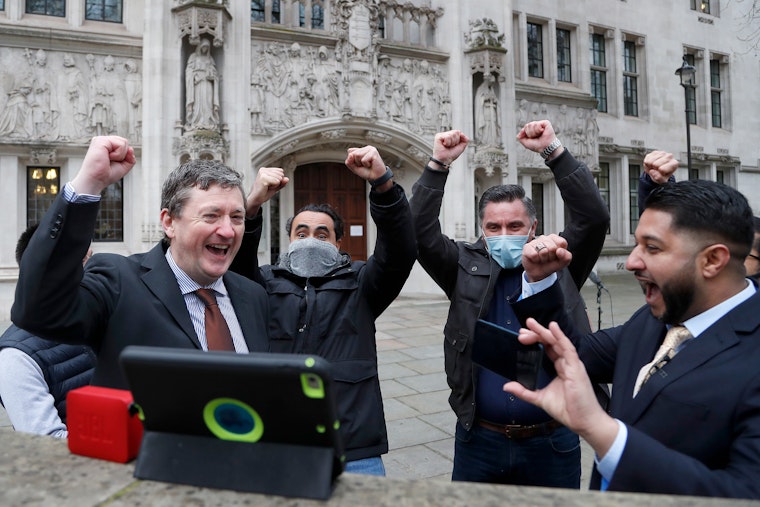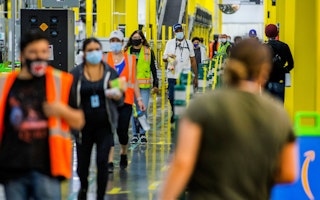Why Uber’s Loss Is a Win for Labor Rights
By Elizabeth Frantz & Renata Cuk

On February 19, workers in the gig economy scored a major victory against exploitation when the United Kingdom Supreme Court, in a unanimous verdict, ruled that Uber drivers are in fact “workers” and therefore eligible for employment rights, including minimum wages and vacations.
The Supreme Court ruling reinforces what Uber drivers have always known—that Uber is an employer and cannot shirk commitments to maintain the most basic of standards. The ruling in this case is a significant milestone in the fight to ensure rights for workers in the gig economy.
While there are reasons to celebrate, a significant headwind remains in the form of well-financed app-based giants. Workers must use the momentum of this victory to keep pressure on companies who seek to use their financial might to erode labor standards. Lawmakers must pay attention too. It should not be in the courts that this fight to protect workers plays out, it should be through legislation.
Two Open Society Foundations grantees had a role to play in the UK Supreme Court victory, as part of Open Society's work to ensure a just future for workers in the global economy. Worker Info Exchange, led by James Farrar, provided critical data needed to fuel this litigation. Farrar and lead co-claimant on the case, Yaseen Aslam, are also spearheading the International Alliance of App-based Transport Workers, the first-ever global federation of app-based drivers. Along with grassroots organizers in more than a dozen countries, they are campaigning transnationally around legal victories.
Uber and other app-based platforms have long argued that workers are independent contractors, which means that Uber has no responsibility to ensure they earn the minimum wage, or to provide any social benefits. As Farrar and Aslam countered in making their case, while Uber pretends to be merely a broker between customer and driver, it performs the role of a manager by deciding fees, allocating fares and firing drivers according to an algorithmic rating system they devise and run.
The United Kingdom Supreme Court agreed.
“Platform companies have run rings around everyone by playing games with contracts and claiming a false new paradigm for modern work where the old rules do not apply,” said Farrar. “The judgment reminds us that the purpose of legislation is to protect workers.”
Fortunately, the fight is now global. Digital economy players, including Uber, are being pursued in jurisdictions from Canada, Italy, France, to South Africa and beyond. Last year the Spanish Supreme Court ruled that riders for the food delivery app, Glovo, were employees, not freelancers. The Spanish government is currently preparing, with workers at the negotiating table, new legislation that will offer a regulatory framework for digital platforms workers. In Bangladesh, drivers pulled off a 24-hour strike and are building collective power to negotiate demands.
These victories are down to the incredible skills and effort by workers to organize themselves into a formidable force. However, lawmakers should be the ones taking the lead on regulating digital platforms, instead of being compelled to act by arduous, time-consuming court cases which companies like Uber can afford to lose.
Even when the law is changed, activists need to be on alert.
In 2019, the California State Senate ruled that app-based companies should treat contract workers as employees and provide health care, unemployment insurance, and other benefits. Rather than complying, Uber, Lyft, and their allies spent more than $200 million bankrolling Proposition 22—the most expensive ballot measure in history—exempting them from labor laws. The firms warned that regulation would lead to higher prices for customers and job losses for drivers. They even threatened to leave the state if they didn’t get their way. With opposition groups hopelessly outspent, the measure was passed in California and is poised to be replicated in states across the United States.
It is a cautionary tale.
Workers and consumers benefit from app-based services. However, companies like Uber seem to think that flexibility and fairness are mutually exclusive. In reality, Uber’s model is a smokescreen for normalizing lower pay for longer hours with no security.
The digital economy does not need to be Dickensian. Food ordering giant Just Eat has announced it is offering workers proper contracts with hourly wages. New apps like bicycle cargo cooperative Pedalme offer drivers the choice of being employees or working flexibly for the national living wage plus commission.
However, aggressive and wealthy platforms can always force their way into jurisdictions with lax regulatory environments. Following their victory in California, Uber has its sights on the European Union, which it would like to see adopt a version of Proposition 22. This would allow Uber to continue to exploit workers across the 27-member bloc. If Uber really believes in a sustainable economic recovery, they will not sacrifice the wellbeing of their workers.
A battle has been won but the war against the Uberization of work is far from over.

Elizabeth Frantz is acting co-director of Equity at the Open Society Foundations.
Until December 2021, Renata Cuk was a program officer with the Open Society Initiative for Europe.


